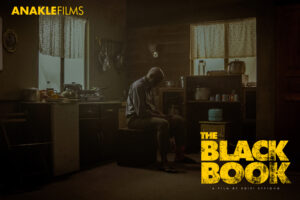The world is tapping into the talent of the African diaspora. This year, we’ve seen Afrobeats artists continuously top music charts, and now the same is happening for films associated with the continent.
The Black Book debuted on Netflix in September. The action thriller made history as the first Nigerian-made movie to land on the platform’s global Top 3. Produced by Anakle Films, The Black Book has made the top 10 lists in over 69 countries, and it has caught the attention of over 20 million viewers so far, according to Enspire.
The Black Book’s director, Editi Effiong, knew the film would be impactful due to its ability to pull at the viewers’ heartstrings.
The intense plot about Paul Edima, a deacon and former hitman who reverts to his old tactics to find justice for his son who was wrongfully slain by corrupt police officers, is the perfect setup for an emotional roller coaster.
“Every human has access to the basic emotions of love, happiness, joy, sadness and grief. But grief is an emotion on its own,” Effiong told Blavity.
He continued, “People don’t realize that [unless] grief is predicated by a thing not existent, and there’s a hole that can’t be filled. And everyone has those emotions.”
While The Black Book is Effiong’s first effort as a director, the former tech professional has honed his skills for bold reactions and visualizing grand scenes on movie sets in previous roles. He served as an executive producer on the 2018 drama Up North and the 2021 sci-fi adventure Day of Destiny.
“My style as a director is setting up a scene that I want you to be part of, whether I want you to be inside or outside of the scene,” he said.
The gripping scenes from The Black Book explore the West African country’s conflicted history with military dictatorship, drug trafficking and politics through a retired hitman’s journey to seek justice.

Numerous titles within the Nollywood film genre reference conflicts that occurred in Nigeria. The director states that while the film encompasses more than that, those situations are the reality for people living there daily.
Effiong said that unwarranted attacks on the youth and individuals within the creative and tech industries inspired him to use murder as the trojan for his message.
“I wanted to elevate the story by going back into Nigerian history. Before Nigeria returned to democracy, we were ruled mainly by military government,” he said. “Military governments are utilitarian, and so there’s a lot of all sorts of things happening. Under our last dictator, a lot of people were executed.”
Effiong added the unknown members of the killing squads associated with the previous regime were an inspiration for Paul’s buried past as a hitman.
“These men never went to jail. Those men still live among regular people,” he said. “People don’t know who they are. What if someone killed the son of one of these guys who was a hitman back in the day? What would that person do? That is the inspiration.”
The Black Book had an impressive budget of $1 million, funded by Effiong and several investors, Wired reported. The budget ensured he could make a film meeting Hollywood’s standards.
“For African films to be seen as successful, they have to be at the same level as Hollywood films. The standards have to be the same, if not better,” he said.
Although Hollywood’s monetary and creative standards were top of mind for the director, he said is very much committed to the tradition of African storytelling. He recalled being a young child fascinated by his mother and her ability to tell a story or sing songs in a traditional way.
“We were all based on traditional storytelling,” he said. “We had these stories as children, but we had never had access to tell them on a global scale.”
Effiong credits his sister with getting the ball rolling by bringing the film to Netflix, and he is delighted to be the catalyst for the celebration of Nollywood cinema on a global scale. Access to global platforms is slowly growing for African creatives. The Black Book is in good company on Netflix, with over 40 titles from Nollywood since the streaming platform launched its presence in Nigeria in 2020.
“With the right platforms, African films can rule the world,” he said. “They can exist shoulder to shoulder with some of the best movies in the world. It’s all about access.”
The Black Book is available for streaming on Netflix. Check out the trailer below!
